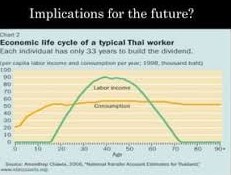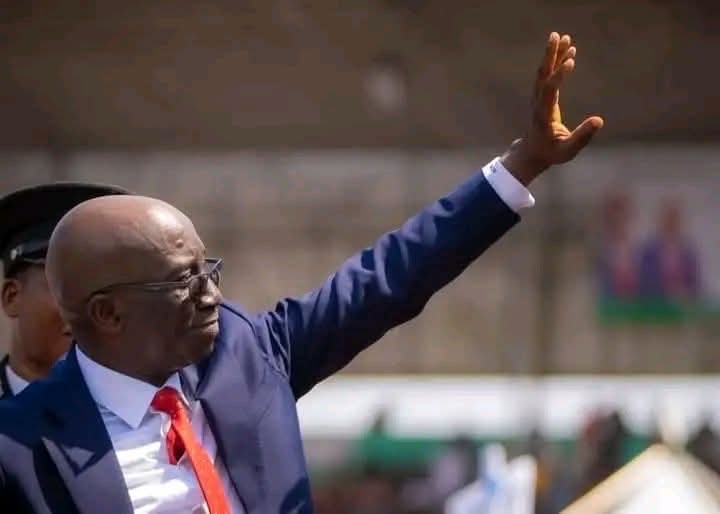It was while working as media aide to Olusegun Aganga in the Ministry of Finance that I first met Razia Khan whom my former paper, BusinessDay had made popular in the financial press. She was Africa chief for Standard Chartered Bank, London. Her name and looks suggest she’s Indian, but she’s actually from Africa, Botswana.
Razia was a guest of the Ministry of Finance, and the paper she delivered was on Nigeria’s demographic advantage. Simply put, she said that Nigeria’s huge population, by itself, guaranteed a measure of economic growth. Under a do-nothing scenario, the food that this huge population eats and the clothes they wear, contribute to the gross domestic product (GDP) growth of the country.
That was a period that Nigeria posted GDP growth rates of about 5 percent. Food was available, and the nation was a middle-income economy. Industries worked, and investment flowed into the country. Barth Nnaji was minister of power, and parts of Lagos, including Festac, had power for up to 20 hours a day. Purchasing power was commensurate with the population at a medium income rate. Consumption was good, and supermarkets thrived. Foreign supermarket chains like ShopRite came in and recorded instant success.
I bet that if Razia were to come today she would deliver a different kind of paper. It’s not that economics has failed – indeed it remains a solid science. What has happened is that circumstances have changed in the case of Nigeria, and a major caveat that underlies economics – all things being equal – has kicked in.
The naira suffered a very steep depreciation in the first year of the Buhari administration. I’ll use a personal anecdote to demonstrate what happened to Nigeria. A week before Christmas 2014, I had a meeting with Team West Africa, my West African partners in Cotonou, Benin Republic. We had a good time. Our treasurer changed the naira at less than N200 to the dollar at Lagos. Each evening, we ate good Nigerian food in the Jonquet neighborhood, courtesy of the good Yoruba population of the city.
From Cotonou, I proceeded to Lome, Togo, for a bit of Christmas shopping. Getting a seat on an Accra to Lagos coach passing through Lome turned out to be a problem. From about December 20, intending commuters had to wait an extra two or three days to get a seat on the buses. My friend, who ran a restaurant at the ABC Transport terminal in Lome, had a roaring season.
A year later, in December 2015, seven months into Buhari’s government, things had changed so drastically. The naira had hit N600 to the dollar, then receded to 500+. That season, I had ventured into Lome again. For one, Emeka who ran the restaurant at the terminus had shut down and relocated to Lagos. His customers had thinned out as the exchange rate eroded their capital base. Goods purchased in Lome became too expensive for buyers in Lagos. It was such that two days before Christmas, passengers could stroll to the terminus and immediately board a Lagos-bound bus from Accra without prior booking. Indeed, virtually all buses that came from Accra were half-empty, and still had a lot of unoccupied seats after Lome and Cotonou. Nigerians got pauperised for no fault of theirs, and a thriving regional trade atrophied.
Since 2015, when the All Peoples Congress took over the Federal Government, all things stopped being equal for Nigeria.
In one fell swoop, Nigeria was devalued into virtual nothingness. First, Buhari took the naira to an unprecedented low of N600 to the dollar, about 200 percent devaluation. Then, Tinubu took the baton and kept racing in the same direction, crossing the hitherto unimaginable trough of N1,000 to the dollar and up to N1,500 per dollar!
To put it in perspective, General Sani Abacha left the naira exchange rate in double digits – less than N100 to the dollar. From the days of General Abdulsalami Abubakar, right through 16 years of the People’s Democratic Party (PDP) presidency, the naira dropped about 100 units to the dollar, exchanging at just below 200/dollar. That’s over a period of 18 years.
But in just nine years of the APC, the naira has dropped a whopping 1,300 points to the dollar!
Between 2010 and now, all things have become so unequal, so to speak. I was at a branch of a major supermarket chain a fortnight ago at Onitsha. At about 6.30pm when the place would have been a beehive of activities, some cashiers were idle. Roll over to 2010/2015, it would take about an hour after loading your trolley for you to reach the cashier. Women with trolleys laden with delicatessen and men with hardware and everything in-between, made progress to the cashier slowly and the cash register buzzed without stopping at the treasury.
Nigeria is by far a shadow of the country it used to be. The purchasing power of Lagos today in dollar terms would be just a fraction of the purchasing power of just a mere district, say Ikeja, 20 years ago. Ditto for every other part of Nigeria. We have lost the demographic advantage, all thanks to an unimaginative government.


